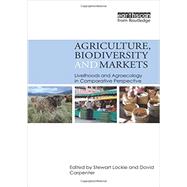- ISBN: 9780415507356 | 0415507359
- Cover: Nonspecific Binding
- Copyright: 1/6/2012
Debate about how best to ensure the preservation of agricultural biodiversity is caught in a counter-productive polemic between proponents and critics of market-based instruments and agricultural modernisation. This book argues that neither position does justice to the range of strategies that farmers use to manage agrobiodiversity and other livelihood assets as they adapt to changing social, economic, and environmental circumstances. Chapters explore relationships between the exploitation and conservation of agricultural biodiversity and the livelihoods of agricultural communities, and evaluate the capacity of national and multilateral institutions and policy settings to support the protection and capture by communities of agrobiodiversity values. The place of ecosystem services in valuing biodiversity in the marketplace is emphasized. A number of authors assess the potential for market-based instruments and initiatives to encourage the protection of biodiversity, while others compare agrobiodiversity/community relationships, and the effectiveness of instruments designed to enhance these, across international boundaries. The book takes a comparative approach, drawing on empirical case studies from across the developed and developing worlds. In doing so, the book does not simply point to similarities and differences in the experience of rural communities. It also shows how global trade and multilateral institutions bring these otherwise disparate communities together in networks that exploit and/or preserve agrobiodiversity and other resources.







